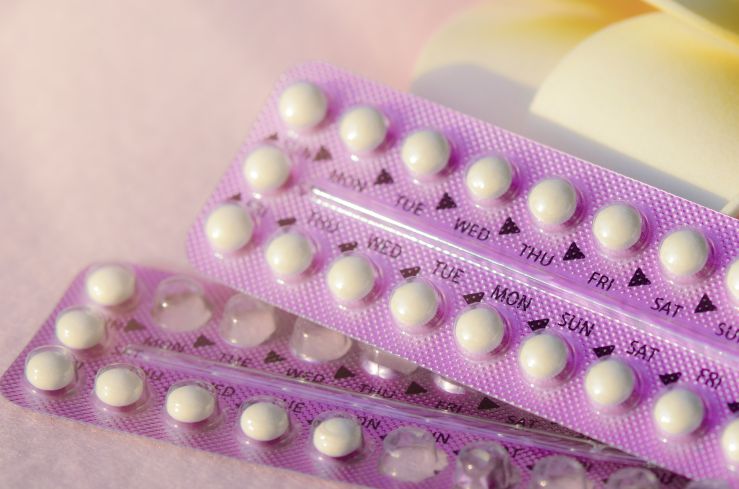
Connect with a verified veterinarian in minutes. Licensed vets are available 24/7 to answer your questions. No need to worry about your furry family member.
Has your dog eaten one or more birth control pills? If so, you’re not alone. For some reason, this is a very common question online. Why would a dog eat birth control pills? He may find the packaging somehow attractive. Perhaps the container looks like a toy or he sees you taking a pill and thinks he may be missing out on a snack!
The good news is that your fur baby should be OK!
What are Birth Control Pills?
Birth control pills are a type of medication that’s prescribed to women to prevent pregnancy. These pills contain either a combination of estrogen and progestin or only progestin. Some birth control pill packs also contain 7 iron pills.
Each package generally contains about 21 tablets of estrogen and/or progesterone and 7 placebo (fake) pills or iron tablets. Each pill contains low amounts of hormones: estrogen pills usually have less than 0.04 mg per tablet.
How Many Birth Control Pills Does It Take to Poison a Dog ?
Each birth control pill may contain between 10-35 micrograms (0.010-0.035 mg) of ethinyl estradiol (a type of estrogen), along with different amounts of progestin.
The dose of birth control pills it takes to be toxic:
- Toy breeds (1-10 lbs): more than 0.45 mg
- Small breeds (11-25 lbs): more than 5 mg
- Medium breeds (26-40 lbs): more than 11.8 mg
- Large breeds (41-70 lbs): more than 18.6 mg
- Extra-large breeds (71-90 lbs): more than 32.3 mg
- Giant breeds (91-110 lbs): more than 41.4. mg
For instance, a 25-lb dog would have to eat about 150 tables with 0.035 mg of estrogen per pill to become poisoned by the medication. So, if your fur baby has eaten one pill, he should be OK.
It’s important to pay attention to the birth control pill packaging. Some brands of birth control pills come in a package that includes 7 days of iron (ferrous fumarate) supplementation. These packages can be dangerous to dogs. One iron pill may contain up to 10-25 mg of iron; dogs can be poisoned by 9 mg of iron per pound.
Not all brands of birth control pills include iron. So, be sure to check the packaging to see if it contains iron pills.

Review symptoms, medications & behavior to keep your pets healthy with a Vet Online in just minutes.
Ask a Vet Live NowWhat to Do If Your Dog Eats Birth Control Pills
It is recommended to phone your veterinarian and give them the following information:
- How many birth control pills your pet has eaten
- Your pet’s body weight (or approximately what size your pet is)
- What type of birth control pills your pet has eaten (progestin-only or combination)
- The brand/ name of the pills (they can then check the concentration of each drug in these pills)
- When your pet ate them
- Whether your pet has eaten any of the packagings of the birth control pills
Your vet may have some more questions for you, but the above points are important information to try and have ready to give them.
Your vet can then calculate how much of each drug your pet has had, and recommend the next best step for your fur baby. This may include an examination and possible lab work (blood tests).
How is Birth Control Toxicity Treated in Dogs?
If your dog has recently eaten the birth control pills, the vet may induce vomiting to keep the medication from being absorbed by your fur baby’s system. The vet may also use activated charcoal to absorb any medication that may be in your dog’s digestive tract. He may also be given intravenous fluids, which work to rehydrate your dog and flush the toxins from his system.
Most dogs make a full recovery, especially if they receive prompt medical treatment.
Unless your dog has eaten a large number of birth control pills for his size, most commonly he will just have an upset stomach, such as vomiting and diarrhea. Your vet will help you decide how best to manage this.
It’s important to note that the plastic packaging on birth control pills could cause a bowel obstruction, which could be a life-threatening emergency for your fur baby.
A bowl obstruction is a complete or partial blockage of the intestines. The blockage keeps solids and fluids in the stomach, unable to be passed through the system.
Symptoms of Bowel Obstruction in Dogs
Symptoms of an intestinal blockage can include:
- Vomiting
- Weakness
- Diarrhea
- Lack of appetite
- Dehydration
- Bloating and abdominal pain
- Hunching and/or whining (from pain and discomfort)
It’s important to contact your veterinarian if your fur baby has eaten a birth control package, even if he is not showing any of these symptoms yet. The sooner your pet receives medical attention, the better his chance of recovery.
Diagnosis and Treatment of Bowel Obstruction in Dogs
When you get to the vet, they will ask you questions on when your dog ate the packaging and the subsequent symptoms you’ve noticed. Next, the vet will perform a complete physical exam and may order blood tests, an ultrasound, or other imaging tests such as x-rays. The imaging tests can help show where the blockage is located, which can help the vet determine the next course of action. Your canine companion may need surgery to remove the blockage.
If caught and treated early, your dog has a very good chance of surviving and living a long, happy life.
Connect with a verified veterinarian in minutes. Licensed vets are available 24/7 to answer your questions. No need to worry about your furry family member.

Evie Moloney, RCVS
This article has been reviewed and approved by an independent Veterinarian: Evie is a vet surgeon who graduated from the University College Dublin, which is the only university offering the veterinary medicine degree in Ireland. She really enjoys surgery and has also worked as an emergency and critical care vet. She is passionate about sharing education about preventative health care for pets, especially the importance of regular dog and cat teeth brushing at home. She also enjoys helping owners find practical solutions for keeping pets as comfortable as possible while living with conditions such as arthritis. When not working, she enjoys hiking and swimming.
Review symptoms, medications & behavior to keep your pets healthy with a Vet Online in just minutes.
Ask a Vet Live Now





